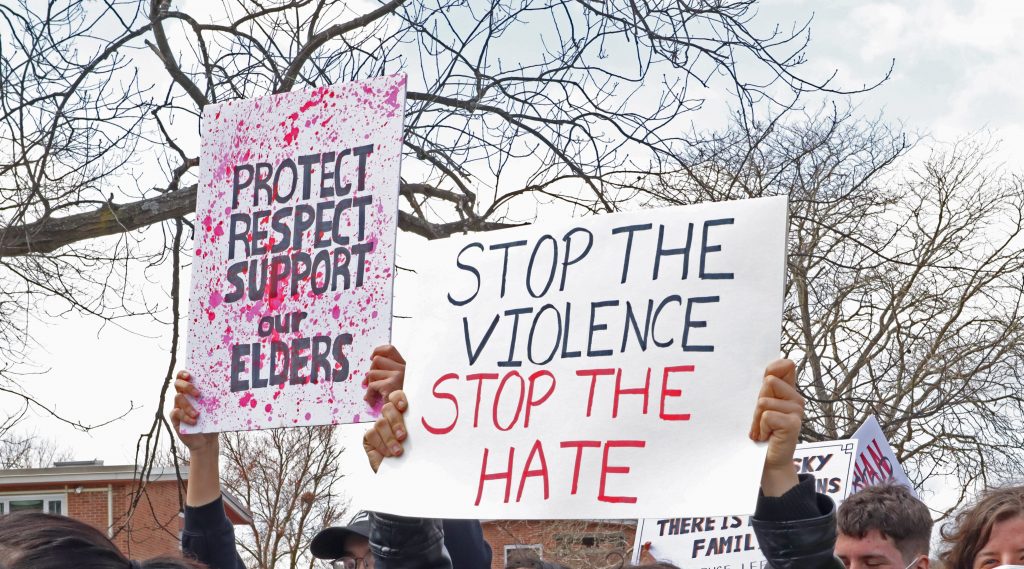On April 4th, Binghamton Pan Asian Leaders Council (BPALC) and the Asian Student Union (ASU) held a “Binghamton Stop Asian Hate Crimes Rally” on campus. It has been a year marked by vicious hate crimes against Asian American and Pacific Islander (AAPI) citizens, and it has been just shy of one month since the violent shooting that claimed the lives of eight Americans, six of whom were of Asian descent, in Atlanta, Georgia.
Despite this, Binghamton University only put out a statement on March 18 addressing the attack and the larger issue of targeted violence against AAPI communities. The statement, jointly released on behalf of BU President Harvey Stenger and Vice President for Diversity, Equity and Inclusion Karen Jones, condemned the shooting and the sharp rise hate crimes, stating that “these acts of violence against the Asian community are absolutely abhorrent have no place in our society or within our own community…”
This statement rings hollow and comes too late — nor is it entirely correct. It’s not a secret that racism, anti-Semitism, homophobia and all other forms of hate permeate our educational institutions, with BU being far from exempt. One incident of anti-AAPI hate in particular comes to mind. On Feb 27, 2000, four Korean American BU students were attacked by a group of student wrestlers on campus yelling racial slurs. Three of the students were left with minor facial injuries and one was left with a fractured skull and internal hemorrhaging. Following the attack, the message BU put out was eerily similar — “Violence and bigotry have no place on campus.’’ This statement was issued two weeks after the attack.
Twenty years later and we are still treating these incidents as just that, incidents. They’re not treated as part of systemic racism or violence, and to the University they are only worth a one-time statement. Even our reports on the growth of anti-AAPI violence date back over a year ago, so why has the administration, who is supposed to lead the community and foster a safe environment, allowed this problem to go on without acknowledgment?
While BU dragged its feet, students took matters into their own hands, namely by organizing the rally at the beginning of the month. Groups such as the ASU hosted a town hall to discuss the issue and have used their Instagram page to spread further awareness, BPALC drafted an open letter to the administration and the BU sociology department will be hosting an antiracism roundtable, co-sponsored by ASU, the Black Student Union (BSU), the Latin American Student Union (LASU), BPALC and the graduate student employee organization this upcoming Sunday to discuss this among other issues. Even the Student Association (SA) published its own statement on March 18 addressing the shootings and providing multiple resources to students interested in helping.
We believe that it is imperative that the University do more to protect its students, such as hiring diverse counseling staff to specifically address the impacts of racism on campus, provide adequate resources and spaces for students of color to address grievances, alert the student body to incidents of racism and investigate thoroughly, among many other more concrete actions. But after what is clearly decades of inaction, it is no surprise that students feel abandoned by their university. BU cannot use students to boost diversity statistics, or tout the work of its AAPI students and staff, only to leave them out to dry when their lives are threatened. AAPI hate is a deep-rooted and complex issue in America, made worse by the model minority myth and fetishization of AAPI cultures. It’s time we attack it like the problem it is, and it shouldn’t take horrific acts of violence for BU to act.
It is for this reason that we have to stand together. Over 500 people attended the “Binghamton Stop Asian Hate Crimes Rally,” and that momentum has to continue. These conversations are incredibly difficult and no one is exempt from addressing the hate within their own groups and communities. We have to show up for each other, because right now, it seems like that’s all we’ve got.
Pipe Dream is included in both our actions and our accountability. We have recognized and will continue to condemn racism against AAPI communities, and all forms of racism, at BU. We also recognized that we too, are complicit. During our weekly editorial meeting, we were made aware of an offensive comic published through the paper in 2011. The comic, hateful toward the AAPI community, was wrong then and is wrong now. After further research, we were also able to discern that the staff of the paper at that time refused to comment when called out on the comic. We want to pick up the ball that was dropped almost 10 years ago. Any hateful or offensive content should not have made its way to publication, and we hope to both condemn this action and learn from our history. Our sincerest apologies — though they come far too late — are extended to the AAPI community, as well as anyone who has been affected. The last few years has allowed us to implement cultural sensitivity training and we are currently working on recording and understanding our own demographics so that we may change our organization for the better. We refuse to simply pretend as though this did not happen and to acknowledge that, at one point, this hateful content was considered acceptable enough to be published at our paper. We do, however, intend to move forward and stand in solidarity with all multicultural communities at BU.



